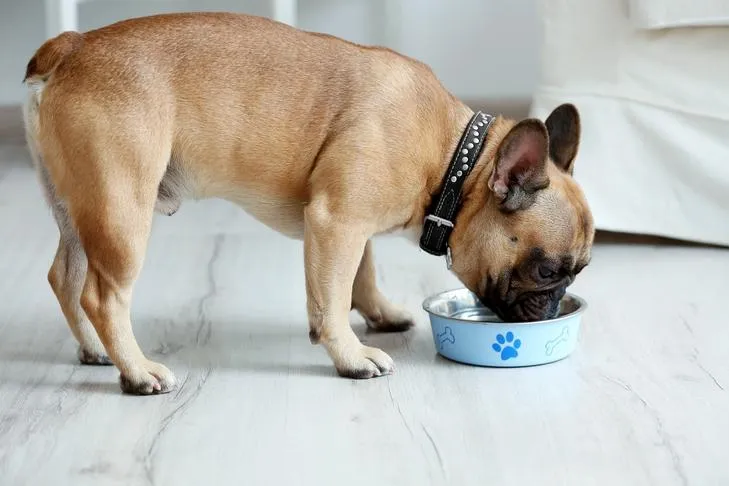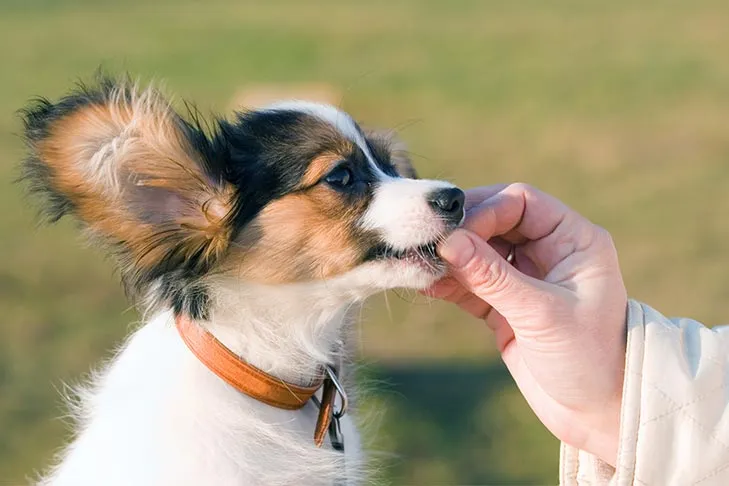Poodles are renowned for their intelligence, elegance, and playful personalities, making them wonderful companions. As a devoted Poodle parent, you naturally want to provide the best for your beloved companion, including a nutritious and delicious diet. While commercial dog food forms the cornerstone of a healthy Poodle’s diet, many owners wonder: What Human Food Can Poodles Eat? Sharing certain human foods can be a delightful way to bond with your Poodle and offer them tasty, healthy treats. However, it’s crucial to know which foods are safe and beneficial, and which ones pose a serious health risk.
Feeding your Poodle human food requires careful consideration, as their digestive systems differ significantly from ours. What might be harmless or even healthy for humans could be toxic or lead to severe health issues for dogs, especially for breeds that can sometimes have sensitive stomachs like Poodles. This comprehensive guide from Dog Care Story will help you navigate the world of human foods, identifying safe options and critical dangers, ensuring your Poodle enjoys a happy, healthy, and well-nourished life.
Safe Human Foods Poodles Can Enjoy (In Moderation)
Many common human foods can be safely incorporated into your Poodle’s diet as occasional treats, provided they are prepared correctly and offered in appropriate quantities. Always introduce new foods slowly and monitor your Poodle for any adverse reactions.
Bread
Small amounts of plain, unseasoned bread can be given to your Poodle occasionally. Ensure it contains no spices, artificial sweeteners, or toxic ingredients like raisins or chocolate, which are dangerous for dogs. While bread offers no significant nutritional benefits for Poodles and is high in carbohydrates and calories, a tiny piece won’t cause harm. Homemade bread is generally a better option than store-bought varieties, as it often contains fewer preservatives. However, it’s best to consider it a rare treat rather than a regular addition to your Poodle’s diet.
Cashews
Cashews are acceptable for Poodles in very limited quantities. These nuts provide beneficial nutrients like calcium, magnesium, antioxidants, and proteins. However, cashews are also high in fat. Feeding too many can lead to weight gain or gastrointestinal upset in Poodles, who can be prone to digestive issues. Always offer plain, unsalted cashews, and only a few at a time as a special treat.
Cheese
Many Poodles adore cheese, and it can be a wonderful high-value treat. As long as your Poodle isn’t lactose intolerant (which is less common than often believed, but still possible), cheese is generally safe. Opt for lower-fat varieties like cottage cheese or mozzarella to prevent excessive fat intake, which can lead to pancreatitis or weight issues in Poodles. A small cube of cheese can be excellent for training or as a pill pocket.
 Poodle looking intently at a block of cheddar cheese on a kitchen counter.
Poodle looking intently at a block of cheddar cheese on a kitchen counter.
Coconut
This versatile fruit can offer several health benefits for your Poodle. Coconut contains lauric acid, which has properties that can help combat bacteria and viruses. It may also aid in freshening breath and improving skin conditions such as hot spots, flea allergies, and general itchy skin, common concerns for some Poodles. Coconut milk and virgin coconut oil are also safe for Poodles in small amounts. Always remove the fibrous outer shell, as it can be a choking hazard or cause intestinal blockage.
Corn
Corn is a common ingredient found in many high-quality commercial dog foods, indicating its safety for canine consumption. It provides carbohydrates, vitamins, and minerals. If sharing corn, ensure it is completely removed from the cob. The cob itself is indigestible and can cause intestinal blockages, a serious concern for any Poodle. Cooked kernels, without butter or salt, are the safest option.
Eggs
Fully cooked eggs are an excellent source of protein, essential amino acids, and vitamins for your Poodle. They can be particularly beneficial for Poodles with an upset stomach due to their easy digestibility. However, never feed raw egg whites, as they contain avidin, an enzyme that can interfere with biotin absorption, potentially leading to a biotin deficiency over time. Scrambled or hard-boiled eggs, cooked thoroughly, make a nutritious treat.
Fish
Cooked fish, especially oily fish like salmon and sardines, offers a fantastic health boost for Poodles. They are rich in Omega-3 fatty acids, which promote healthy skin and a shiny coat (a Poodle hallmark!), support joint health, and aid brain development. Salmon also provides ample protein and vitamins. Sardines are beneficial because their small, soft bones are digestible and add extra calcium. Always ensure fish is fully cooked and all tiny bones are meticulously removed, except for the soft bones in sardines. Limit fish intake to once or twice a week to avoid over-exposure to potential contaminants like mercury.
Ham
While not the healthiest option, small, lean pieces of cooked ham are generally safe for Poodles. Ham is often high in sodium and fat, so it should only be offered sparingly as a very occasional treat. Excessive amounts can lead to gastrointestinal upset or contribute to health issues like pancreatitis in Poodles. Ensure it is plain, without glazes, spices, or marinades.
Honey
Honey is a natural sweetener packed with beneficial nutrients such as vitamins A and B, potassium, calcium, magnesium, copper, and potent antioxidants. Small, occasional amounts of local honey might even help Poodles with seasonal allergies by introducing small amounts of pollen, potentially building immunity. Beyond consumption, honey can also be used topically on minor burns or superficial cuts due to its antibacterial properties.
Milk
Poodles can have milk in small quantities, but owners should proceed with caution. Some Poodles, like other dogs, may be lactose intolerant and can experience digestive upset, including diarrhea and gas, after consuming dairy products. If you give your Poodle a small amount, monitor them closely for any adverse symptoms. Water is always the best and safest hydration choice.
Peanut Butter
Plain, unsalted peanut butter can be an excellent source of protein, healthy fats, vitamins B and E, and niacin for your Poodle. However, it is absolutely critical to check the label for xylitol, a sugar substitute that is highly toxic and potentially lethal to dogs, even in small amounts. Always choose raw, unsalted, xylitol-free peanut butter as the healthiest and safest option. It’s perfect for filling Kongs or as a training reward.
Peanuts
Unlike some other nuts, plain peanuts are safe for Poodles to eat in moderation. They are packed with beneficial fats and proteins. However, due to their high fat content, overfeeding can lead to weight gain or pancreatic issues. Always offer unsalted peanuts to avoid excessive sodium, which is detrimental to your Poodle’s health.
Popcorn
Unsalted, unbuttered, air-popped popcorn can be a fun, occasional treat for your Poodle. It contains riboflavin and thiamine, which support eye health and digestion, along with small amounts of iron and protein. Ensure all kernels are fully popped, as unpopped kernels can be a choking hazard or cause digestive issues for Poodles. Avoid any toppings or seasonings.
Pork
Cooked pork is a highly digestible protein source, rich in amino acids, and can be a good option for Poodles. It may also be less likely to cause allergic reactions in some pets compared to more common proteins. When feeding pork, ensure it is thoroughly cooked, lean, and free of excessive fat, skin, bones, or any seasonings like salt, onions, or garlic, which are toxic to dogs.
Quinoa
You might notice quinoa listed as an ingredient in some high-quality dry dog foods, and for good reason. This ancient grain boasts a strong nutritional profile, making it a healthy alternative to more common starches like corn, wheat, and soy often found in kibble. Cooked, plain quinoa can be a beneficial addition to your Poodle’s diet in small amounts, providing fiber, protein, and essential minerals.
Salmon
As highlighted previously, fully cooked salmon is an outstanding source of protein, healthy fats, and amino acids, vital for your Poodle’s overall health, including joint function, brain health, and a robust immune system. It’s crucial to understand that raw or undercooked salmon can harbor parasites that cause salmon poisoning disease, a severe and often fatal illness in dogs. Symptoms include vomiting, diarrhea, dehydration, and lethargy. Always ensure salmon is cooked thoroughly to eliminate these parasites.
Shrimp
A few cooked shrimp now and then can be a delightful and healthy treat for your Poodle. Shrimp are low in fat, calories, and carbohydrates, while being rich in antioxidants, vitamin B-12, and phosphorus. It is imperative that shrimp are fully cooked and completely peeled, with the tail, head, and legs removed, to prevent choking hazards or digestive problems.
 A Miniature Poodle happily enjoying a small portion of safe human food from its bowl.
A Miniature Poodle happily enjoying a small portion of safe human food from its bowl.
Tuna
Poodles can safely eat tuna in very small, controlled amounts. Cooked, fresh tuna is an excellent source of omega-3 fatty acids, which support heart and eye health. When considering canned tuna, opt for varieties packed in water, not oil, and ensure it contains no added spices. While small amounts are fine, avoid excessive canned tuna due to potential mercury content and high sodium levels, which can accumulate and become problematic for your Poodle over time.
Turkey
Plain, cooked turkey is a lean, digestible protein that is safe for Poodles. Ensure all excess fat and skin are removed, as they can be difficult to digest and contribute to pancreatitis. Crucially, always double-check for bones; poultry bones can splinter easily, posing a severe risk of internal injury or blockage in your Poodle’s digestive tract. Any turkey seasoned with salt, onions, garlic, or other spices should be strictly avoided.
Wheat or Grains
Contrary to popular belief, grains like wheat, oats, and rice are not inherently bad for dogs. In fact, for most Poodles, grains are excellent sources of protein, essential fatty acids, and fiber, contributing to healthy digestion and energy. Unless your Poodle has a confirmed grain allergy (which is relatively rare), there’s no need to feed a grain-free diet. Consult your veterinarian if you suspect a grain allergy.
Yogurt
Plain, unsweetened yogurt can be a perfectly acceptable snack for Poodles, especially those that can digest dairy products without issue. The active cultures (probiotics) found in plain yogurt can help strengthen your Poodle’s digestive system. Always choose plain varieties without added sugars, artificial sweeteners (especially xylitol!), or fruit flavorings. Greek yogurt can be a good option due to its lower lactose content.
 A small Poodle puppy gently taking a healthy treat from a human hand.
A small Poodle puppy gently taking a healthy treat from a human hand.
Human Foods Poodles Must Avoid (Toxic & Dangerous)
While many human foods offer safe treats, it’s paramount for Poodle owners to be aware of foods that are highly toxic and can cause serious illness or even death. Always keep these items out of your Poodle’s reach and contact your veterinarian immediately if you suspect your Poodle has ingested any of them.
- Chocolate: Contains theobromine and caffeine, which Poodles cannot metabolize efficiently. Symptoms range from vomiting and diarrhea to seizures, tremors, and heart problems. Dark chocolate and baking chocolate are the most dangerous.
- Grapes and Raisins: Highly toxic to dogs, including Poodles, causing acute kidney failure. Even small amounts can be deadly. The exact toxic agent is unknown, but the danger is undeniable.
- Onions, Garlic, Leeks, and Chives: These alliums contain compounds that can damage a Poodle’s red blood cells, leading to anemia. Garlic is five times more potent than onions. Symptoms may include weakness, vomiting, breathlessness, and pale gums.
- Xylitol: A common artificial sweetener found in sugar-free gum, candies, baked goods, and some peanut butters. Xylitol causes a rapid release of insulin in dogs, leading to a sudden and severe drop in blood sugar (hypoglycemia), liver failure, and even death. It is extremely toxic to Poodles.
- Alcohol: Even small amounts of alcohol can cause alcohol poisoning in Poodles, leading to vomiting, diarrhea, central nervous system depression, coordination problems, tremors, difficulty breathing, and coma.
- Avocado: Contains persin, a fungicidal toxin. While generally considered a low risk for dogs, large amounts, especially the pit and skin, can cause vomiting and diarrhea in some Poodles. The pit also poses a choking hazard.
- Macadamia Nuts: Highly toxic, causing weakness, vomiting, tremors, hyperthermia, and depression in dogs. The exact mechanism of toxicity is unknown, but effects can last for 12-48 hours.
- Caffeine: Found in coffee, tea, energy drinks, and some medications. Caffeine can cause heart palpitations, hyperactivity, tremors, and seizures in Poodles.
- Cooked Bones: While raw bones can be a controversial topic, cooked bones are universally dangerous. They become brittle and can splinter, causing choking, internal lacerations, or blockages in a Poodle’s digestive tract.
- Fat Trimmings and Greasy Foods: Can cause pancreatitis, a painful and potentially life-threatening inflammation of the pancreas, especially in breeds prone to digestive sensitivities like Poodles.
- Salt: Large amounts of salt can lead to sodium ion poisoning, causing vomiting, diarrhea, tremors, elevated body temperature, seizures, and even death. Avoid overly salty foods.
- Yeast Dough: Uncooked yeast dough can rise in a Poodle’s stomach, causing painful bloating and potentially twisting of the stomach (bloat/GDV), a life-threatening emergency. The yeast also produces alcohol during fermentation, leading to alcohol poisoning.
Important Considerations When Feeding Human Foods to Poodles
When deciding what human food can Poodles eat, remember these key guidelines to ensure safety and maintain their health:
- Moderation is Key: Even safe foods should only be offered as occasional treats and in small quantities. They should never replace a balanced commercial dog food, which is formulated to meet all your Poodle’s nutritional needs.
- Proper Preparation: Always cook foods thoroughly and serve them plain. Avoid adding salt, butter, oils, spices, garlic, onions, or any other seasonings. Remove all bones, seeds, pits, and rinds.
- Monitor for Sensitivities: Poodles, like all dogs, can have individual sensitivities or allergies. Introduce any new food in very small amounts and observe your Poodle for any signs of digestive upset (vomiting, diarrhea, gas) or allergic reactions (itching, hives).
- Portion Control for Poodles: Poodles come in various sizes (Standard, Miniature, Toy), and portion sizes should be adjusted accordingly. What’s a small treat for a Standard Poodle might be too much for a Toy Poodle. Small breeds are more susceptible to adverse reactions from even tiny amounts of harmful substances.
- Consult Your Veterinarian: Before making significant changes to your Poodle’s diet or if you have any doubts about a specific food, always consult your veterinarian. They can provide personalized advice based on your Poodle’s age, health status, and specific dietary requirements.
Conclusion
Understanding what human food can Poodles eat is essential for any responsible Poodle owner. While sharing certain human foods can be a delightful and healthy addition to your Poodle’s diet, vigilance and knowledge are paramount. By sticking to safe, plain, and properly prepared options in moderation, you can offer your Poodle a variety of delicious treats that enhance their well-being.
Always prioritize your Poodle’s health by avoiding all known toxic foods and consulting your veterinarian with any concerns. Your Poodle relies on you to make informed dietary choices, ensuring they lead a long, happy, and vibrant life. For more detailed information on Poodle health and nutrition, explore our other articles at Dog Care Story!
